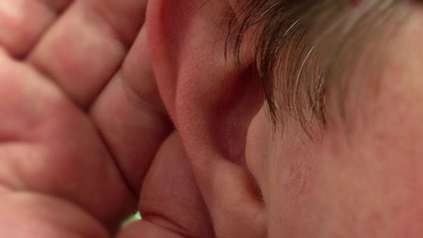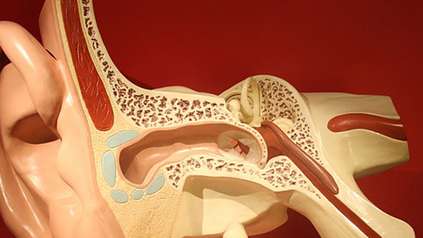Mice reveal 38 new genes involved in hearing loss
Multiple new genes involved in hearing loss have been revealed in a huge study of mouse mutants by researchers from the Wellcome Sanger Institute and King’s College London, and colleagues. The new genes reveal the metabolic pathways and regulatory processes involved in hearing.
The study, published today (April 11) in the open-access journal PLOS Biology, helps to understand the underlying biology of deafness, and also provides a rich source of therapeutic targets for the restoration of hearing.
Progressive hearing loss with age is extremely common in the population, leading to difficulties in understanding speech, increased social isolation and associated depression. It can often be inherited, but so far very little is known about the molecular pathways leading to hearing loss, hampering the development of treatments.
To identify new molecules involved in hearing loss, the researchers took a genetic approach and created 1,211 new mouse mutants. They screened each of these mice using a sensitive electrophysiological test, the auditory brainstem response, to find out how good their hearing was.
This large-scale screen of targeted mouse mutants identified 38 genes involved in hearing loss in the mice, which had not been previously suspected to be involved in hearing.
The researchers also analysed human DNA data* to ask if any of these 38 genes discovered in mice were associated with human adult-onset hearing loss. They found 11 of these 38 genes were significantly associated with hearing ability in the UK population. Furthermore one gene, SPNS2, was associated with childhood deafness.
Some of these genes revealed molecular pathways that may be useful targets for drug development.
“This is the first time that a study of this scale has looked at levels of hearing and different types of hearing loss in mouse mutants and shows the power of large genetic screens. Only a handful of genes have previously been linked specifically to age-related hearing loss in adults, now our study adds many more potential new genes to follow up.”
Dr Chris Lelliott An author from the Wellcome Sanger Institute
Further analysis of the genes identified, and the many different mechanisms within the ear that were revealed by the mutations, suggested that hearing loss is an extremely varied disorder and may involve as many as 1,000 genes.
“This study is giving a huge insight into the complicated biology of hearing loss, and shows that because of all the different genes and pathways found, there won’t be a single ‘magic bullet’ to stop all age-related deafness. This emphasises the value of mouse studies for identifying genes and mechanisms underlying complex processes such as hearing.”
Dr Selina Pearson From the Wellcome Sanger Institute
The study findings suggest that therapies may need to be directed at common molecular pathways involved in deafness rather than individual genes or mutations.
“Several of these new mouse mutant lines showed normal development of hearing followed by later deterioration, suggesting the genes involved are good candidates for human age-related hearing loss. Our next step is to find out if we can influence the molecular pathways involved to slow down or stop the progression of hearing loss.”
Professor Karen Steel Senior author on the paper from the Wellcome Sanger Institute and King’s College London
More information
Publication:
Ingham NJ, Pearson SA, Vancollie VE, Rook V, Lewis MA, Chen J, et al. (2019) Mouse screen reveals multiple new genes underlying mouse and human hearing loss. PLOS Biology. DOI: 10.1371/journal.pbio.3000194
*This work used openly accessible data and samples generated by the 1958 Birth Cohort https://www.metadac.ac.uk/1958bc/
Funding:
This work was supported by Wellcome, the Medical Research Council, European Commission, Action on Hearing Loss, the Haigh Fellowship in age related deafness, and Deafness Research UK.
Selected websites
King’s College London
King’s College London is one of the top 25 universities in the world (2017/18 QS World University Rankings) and among the oldest in England. King’s has more than 26,500 students (of whom nearly 10,400 are graduate students) from some 150 countries worldwide, and nearly 6,900 staff. The university is in the second phase of a £1 billion redevelopment programme which is transforming its estate. www.kcl.ac.uk
The Institute of Psychiatry, Psychology & Neuroscience (IoPPN) at King’s College London is the premier centre for mental health and related neurosciences research in Europe. It produces more highly cited publications in psychiatry and mental health than any other university in the world (Scopus, 2016), with 12 of the most highly cited scientists in this field. World-leading research from the IoPPN has made, and continues to make, an impact on how we understand, prevent and treat mental illness and other conditions that affect the brain. www.kcl.ac.uk/ioppn
The Wellcome Sanger Institute
The Sanger is one of the world’s leading genome and biodata institutes. Through its ability to conduct research at scale, it is able to engage in bold and long-term exploratory projects that are designed to influence and empower science globally. Institute research findings, generated through its own research programmes and through its leading role in international consortia, are being used to develop new diagnostics and treatments for human disease and to understand life on Earth. Find out more at scion-02.sandbox.sanger.ac.uk or follow @sangerinstitute on Twitter, Facebook, LinkedIn and on our Blog.
About Wellcome
Wellcome exists to improve health by helping great ideas to thrive. We support researchers, we take on big health challenges, we campaign for better science, and we help everyone get involved with science and health research. We are a politically and financially independent foundation. wellcome.org




